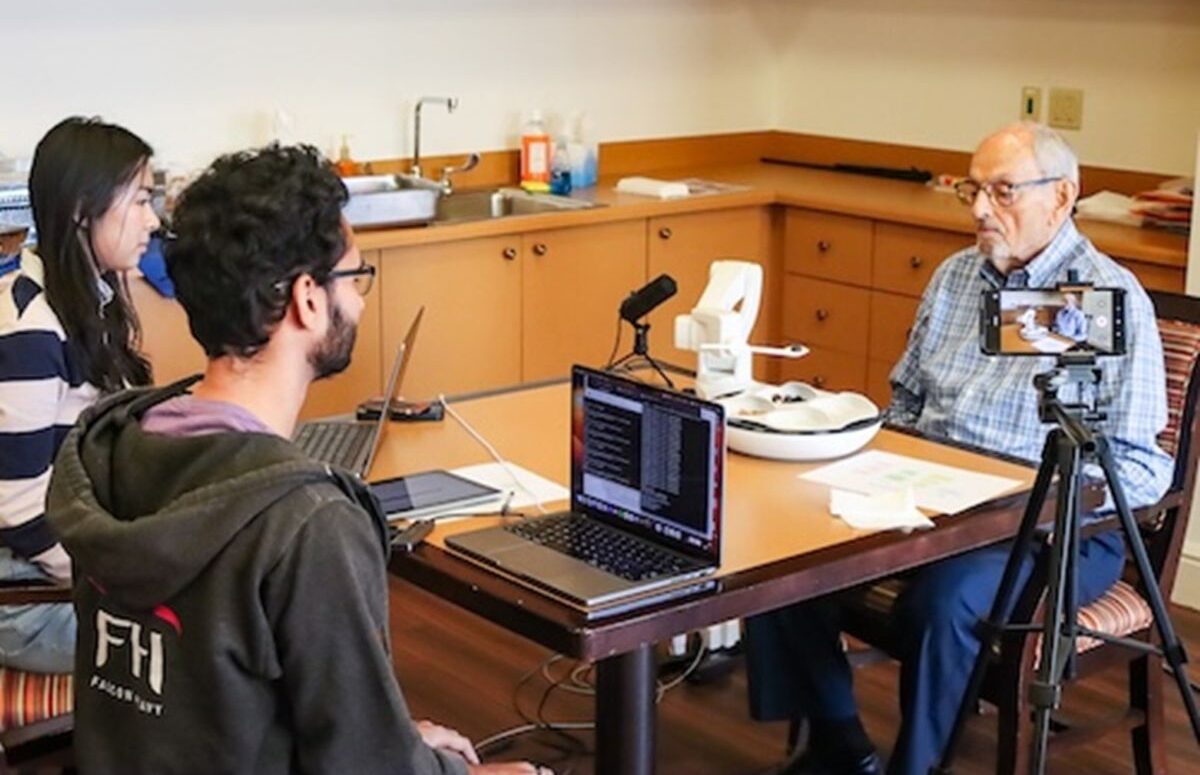In 2023, when Dr. Zackory Erickson, an assistant professor at Carnegie Mellon University’s (CMU) Robotic Caregiving and Human Interaction Lab, needed an aging services organization to help him and his students develop assistive technology robotics for older adults, Baptist Senior Family, a LeadingAge member in Pittsburgh, PA, stepped up. The connection had been serendipitous: a CMU employee who knew of the research is a friend of Amy Dukes, Baptist Senior Family’s vice president of marketing and public relations.
The introductions made, Baptist Senior Family staff and residents were intrigued by the proposed project: to help students collect data to inform a framework for integrating large language models (LLMs) as speech interfaces for robots, especially for people who have lost motor function due to neurodegenerative disease, stroke, or spinal cord injury. A group of older adult volunteers, personal care and memory support residents at Baptist Senior Family’s Providence Point life care community, met with students to offer feedback and suggestions on how such interfaces might be made human-centric and be positively regarded by users. The students later used their findings to help develop an assistance robot named Alfred, designed with human-computer interfacing capacity.
This experience, said Dr. Z. Allen Abbott, vice president of philanthropy for Baptist Senior Family, “shifted our thinking toward early adoption of technology that contributes to wellness, and opened the door to a wonderful partnership.” Since then, CMU student groups have continued to reach out to the organization to help in the development and testing of new assistive technologies.
“In each project,” Abbott said, “the students are given the opportunity to meet with the resident population to explain the study, and the residents then decide if they want to volunteer. Staff [are also pleased] to be directly involved with these ventures, maintaining the human touch with our residents.” He added that for the volunteers, participating mitigates some of their reticence about artificial intelligence (AI), robotics, and other technologies.
A second project with CMU, funded by the National Science Foundation, involved 11 Providence Point residents who volunteered to test Obi Robot, a device that helps feed persons who can no longer feed themselves. The commercially available version of Obi is controlled by buttons, but the CMU study paired a research version of the device with a LLM-based speech interface to enable users to control it with verbal commands—easier for those who have challenges with limb control. The study, which featured the residents being fed by the robot as they tested voice commands, was the subject of a paper published in July 2024 in UIST and an accompanying video with residents demonstrating the device.
A third project, in 2024, was a data-collecting exercise to guide development of an assistive cooking system. CMU students staged independent living apartments with cameras at both Baptist Senior Family locations, Providence Point and Baptist Manor, a HUD Section 236 affordable housing community. Volunteers were instructed to enter the kitchen and cook spaghetti, broccoli, and other items. They were given no further instructions, but did experience distractions devised by the researchers. They were filmed and studied for their sequencing, reactions to the distractions, and recall. The data assisted a study on early detection of cognitive decline, part of a larger study on human/robot interaction among those experiencing memory loss.
Future projects, Abbott said, will explore wearable and speech interfaces for controlling robots, robotic manipulation of challenging items like garments and blankets, and observational studies of nurses to identify opportunities for robots in wound care.
Asked why researchers like him value such partnerships with aging services providers, CMU’s Erickson said the interactions allow building “connections with faculty around topics of interest,” and added that faculty, who are responsible for getting studies started, are always looking for ideas. And, Erickson noted, “they also have students who need projects to complete their degrees.”
For its ongoing partnership with CMU, Baptist Senior Family received the 2025 LeadingAge PA Innovation of the Year Distinguished Service Award.
On the Drawing Board: a New Technology Innovation Center
Baptist Senior Family’s innovative wellness programming, along with its positive experience with the technology partnership, has sparked ambition to develop a new center on the Baptist Manor campus, open to both residents and the public, combining wellness and technology research.
Abbott said plans for the property, which should be firmed up in 2026, are still fluid, though the organization is now meeting with potential partners (from technology companies as well as higher education) and the City of Mt. Lebanon. The idea, he said, is a wellness center free to Baptist Senior Family residents and open to the public on a membership basis. Where does technology research fit in? “Membership could include an acknowledgement that members’ health data will be gathered and shared anonymously with our research partners, for the good of our field and the betterment of life for older adults everywhere,” Abbott said. He also envisions public space such as a cafe, a bodega, and a lecture hall.
“Our residents believe strongly in our mission,” added Abbott. “Many have been involved in research and higher education throughout their lives. They know that these projects lead to academic studies and new assistive technologies that improve quality of life for all older adults. Volunteering in these studies … provides them with another way to contribute to the world, which enhances their sense of meaning and purpose.”
Photo: Ron Feller, right, a Providence Point resident, tests a voice-controlled Obi Robot with Carnegie Mellon University students. Photo courtesy of Baptist Senior Family.
Do you have a story of innovation to tell? Use the LeadingAge Story Collector, powered by Greystone, to tell us your best new practices in operations, technology, workforce development, service delivery, partnerships, and more. Try it now.

 Shutdown Week Three: Impact of Ongoing Closure on Affordable Housing
Shutdown Week Three: Impact of Ongoing Closure on Affordable Housing


